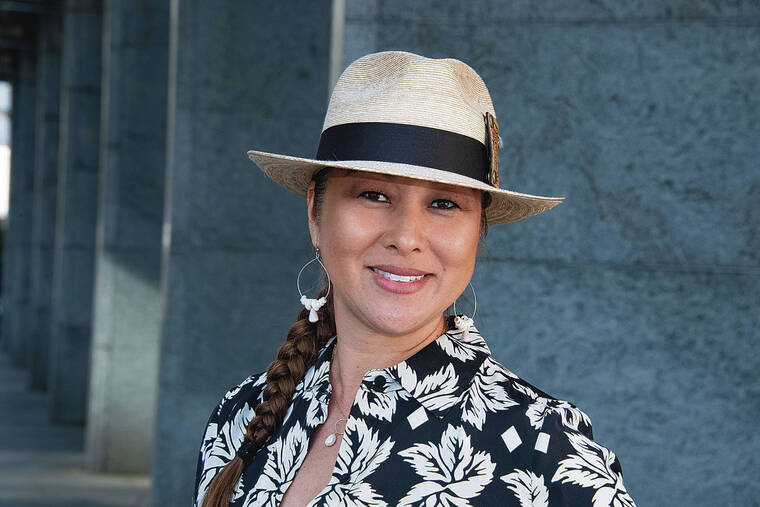Five Questions with Julie Morikawa
By Vicki Viotti | Honolulu Star-Advertiser
November 18, 2022

THE BIO FILE
Title: President, ClimbHI
Personal History: Roots on Hawaii island; lives in Honolulu with husband, son and daughter.
Education: Graduated from Punahou School; earned a bachelor’s degree in hotel administration from the School of Hotel Administration at Cornell.
Professional History: Founded the nonprofit ClimbHI in 2009. Previously worked in positions throughout the U.S. and internationally for large-scale hospitality brands.
Quote that inspires me: “If you plan for a year, plant kalo. If you plan for 10 years, plant koa. If you plan for 100 years, teach the children.”
Founded in 2009, ClimbHI seeks to inspire students to finish high school and proceed to post-secondary education or employment by exposing them to future career paths and the steps necessary to achieve those goals.
Growing up in Hawaii, my first exposure to the hospitality industry was dancing hula on cruise ships and performing in hotels. But there were few resources to guide me when con- sidering a career.
After graduating from the School of Hotel Administration at Cornell and spending nearly a decade in the hospitality industry, I founded ClimbHI to ensure that our future generations have easily accessible career tools and connections right here in Hawaii.
And while ClimbHI’s roots are in hospitality, the vision has always been to broaden that focus and showcase a wide variety of opportunities. Most importantly, ClimbHI encourages and inspires our keiki, the future of Hawaii. This is our home, our aloha, and our future.
2. What is the range of the career programs it now offers high school students?
ClimbHI works with thousands of students, educators, businesses and partners each year under four primary programs:
- ClimbHI has created a state-of-the-art online portal called ClimbHI Bridge. This new tool safely and efficiently links thousands of students and teachers with businesses and nonprofits statewide to provide enhanced educational and career opportunities. Since its launch in January 2021, the Bridge has reached more than 62,000 students, and has participation from 580 businesses, 190 schools and 4,300 educators.
- Launched in summer 2022, Hospitality for Me provides a full suite of hospitality resources for schools statewide to make hospitality education and job readiness a standard offering. This initiative is timed to align with the Hawaii Department of Education’s expansion from six to 13 pathways, allowing hospitality, tourism and recreation to shine as its own pathway. Hospitality for Me is already assisting schools throughout Hawaii by connecting schools with industry leaders and organizations to provide valuable resources for students.
- The LEI Program, which was created in partnership with industry and government stakeholders, celebrated its 10th program year this spring. The program has helped 7,000 high school and 1,000 college students, with more than 120 participating businesses each year. LEI has also been integrated into course curriculums for Hawaii Pacific University, Kauai Community College and Maui College.
- In 2020, ClimbHI partnered with Cornell University and the Hawaii Tourism Authority to create a custom certificate program for the DOE that provides fundamental skills for employment in the hospitality industry and beyond. The ClimbHI Service Excellence Certificate for the DOE Career and Technical Education Hospitality Pathway allows graduates to be more workforce-ready and arms them with important life skills. More than 1,500 students have completed the program, and we will have nearly 2,000 participants by the end of this academic year.
3. Have the learning losses from the pandemic caused career barriers for the kids?
Everyone is searching for new talent, and the pandemic forced us all to adapt and integrate new ideas in unprecedented ways. Interestingly, students now have more opportunities than ever to come directly into the workforce.
For example, the health care industry has created a “glidepath” for high school students to train and transition into high-demand positions without post-secondary education.
We see businesses and communities stepping up to create new avenues for student success, helping to offset the challenges of the pandemic.
4. Which fields offer career pathways that more students should know about?
There are ample opportunities and resources across every industry. The primary challenge is creating effective awareness so that we not only get in front of students, teachers and parents, but we also inspire keiki to pursue their professional dreams and make the connections.
5. What are your goals for ClimbHI? What would signal its success to you?
That all keiki who want to stay in Hawaii can find a career and thrive. We want to be sure we are not just filling positions, but helping our students dream big and fulfill those dreams here at home. When we talk about improving social capital, we are looking at the whole picture — students, parents, schools, teachers and businesses.
For example, we support educators with externships to improve their learning opportunities, and for businesses, we build healthy workforce pipelines. For schools and students, we are creating equity by offering the same opportunities at our most remote locations as we do at our largest and most urban. When our keiki are happy, our education system and our businesses benefit — everyone wins
Bonus Question: How do you think career preparation has changed since you were in high school?
We have much more access to technology and interconnectedness, which brings a vast number of resources to our students. It’s our responsibility to best communicate these opportunities to students and showcase what is available across every career pathway.
Nearly half of our students don’t go on to college, which we would like to improve, but we also want to expose them to everything that is possible.
For more, visit climbhi.org.
